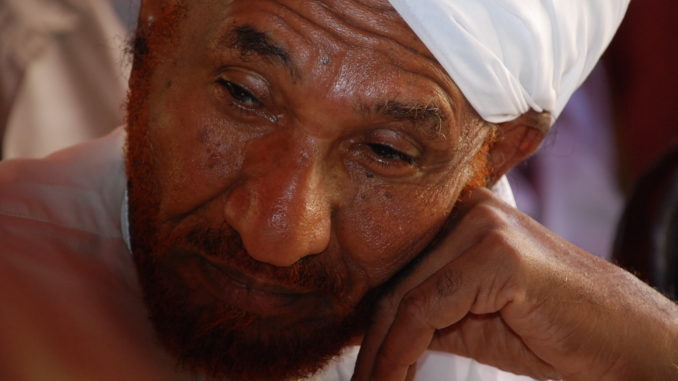
43 Years of Sudanese Independence
A Tearful Smile
Forty Three years ago, the Sudan was a virtual show piece.. The National Political Parties had successfully outmaneuvered the CONDOMNIUM States and succeeded to a united, Democratic, Sovereign State.
The economy was viable producing enough to satisfy National Consumption, and to pay for the National imports. The internal financial balance realized enough surplus to finance a program of moderate Development. The external balance was in favor of the Sudan producing a healthy reserve. Income per capita was $550 which equals to $5500 in 1998 Dollars. The Sudanese pound was $3.5 compared to its dismal current value of 0.04 of a cent.
The Sudanese civil service, the Sudanese armed forces, the Sudanese National University, and so on were second to none in the Third World. For the Sudanese leaders of opinion, the sky was the limit as far as the country’s prospects were concerned.
To day, the Sudan is again a show piece.. A show piece for disaster!. For the Sudanese in the know, the country is in a free fall without a bottom.
How did this come about?
The Sudanese National Parties have created a Democratic system of government which couldn’t avoid the loopholes inherent in Underdevelopment, but maintained free and fair elections, respected the neutrality of the civil and armed services, respected the independence of the Judiciary, and the freedom of the Press. However, they have been responsible for three failures of omission. They are:
- The failure to cater for the material and cultural interests of National groups which were not sufficiently articulate to cater for their own interests, particularly in the “closed areas” which the colonial authorities reserved for special designs.
- The failure to restructure the pattern of development bequeathed from the colonial era in the direction of equity and balance.
- Failure to see that the transplantation of democracy as a highly advanced system of government, in the circumstances of under-development, required a culture of balances and institutions to protect it and make it sustainable.
However, the National Political Parties have had no time to develop themselves or tackle the National problems. They ruled for a quarter of the period since independence. 75% of that period was monopolized by the Military Juntas. The juntas committed errors of commission. They were:
- The attempt to jump over Sudanese social and cultural realities to apply a Communist fundamentalism in the early years of the May Junta, and the equally demagogic attempt to apply Isalamicist fundamentalism in the later years of that Junta, and the whole life span of the June Junta.
- The ultimate solution of the historical National conflict was always the military option. For some time NIMERI in search for an alternative power base after his loss of communist support, adopted the homework of the previous Democratic regime (Namely; The Round Table Conference 1965, the Twelve-Man Committee 1966 and the All- Parties Conference 1967), made use of the windfall of Western Good will following the massacre of his old allies – The Sudanese Communist Party, and reached the 1972 peace agreement. However, he soon betrayed the agreement through dictatorial measures and ill advised adventures in the cold war, landed the country with a civil war which was by far worse and more dangerous than the one he had ended by the 1972 Agreement.
- The Juntas, particularly the last two, have soiled the Sudanese body politic with a most unholy mixture between a group of doctrinaire intellegensia which succeeded in indoctrinating a section of society but could see no hope for power through the ballot box, and groups of power hungry military officers. The type of officer involved in that alliance is not the standard, efficient and disciplined officer. But is a type with gigantic ambitions and limited abilities. The type of intellegensia involved is also no standard. They seek all power and quickly! For the Sudan, this unholy alliance has been a socio- political “weapon of mass destruction”.
The present Sudanese Islamicist Junta has reproduced all the errors of the May Junta in its communist and Islamicist phases, developed them to an Nth power, and added some of its own. Its policies and practices add up to form a list of what best be avoided in the government of Sudan and the development of its society. What best to avoid is the legacy of the June Junta for Sudan.
The people of Sudan have a great endowment of idealism and tolerance. They have a great stock of academic, professional and technical qualifications. Their country is rich in natural resources. They enjoy a huge fund of Regional and International good will. Through the purgatory of the “Salvation Regime” the peoples of the Sudan have learnt their lesson. The negative regional and international impact of the “salvation regime” could furnish the Sudan with a substantial “Post SALVATION” dividend.
Therefore, if the Present Regime does not last enough to totally destroy the Sudan, the Sudan will bounce back, rise from the ashes and live to witness heights where the sky is the limit.
In the last two decades, dictatorship with all its fanciful ideologies has been eliminated in Southern Europe, Latin America, many Asian and African territories and Eastern Europe. All in All, democratic transformation has taken place in more than sixty countries. In about 10% , the change was violent; in the rest, it was more or less peaceful.
For the Sudan, all scenarios are possible including its own unique form of democratic replacement through the National uprising.
Internally and externally, dictatorship has come to the end of its tether.
On the eve of the 43rd year of Sudan’s Independence, the tearful face of the Sudan may yet smile for a promising future.
Al Sadig Al Mahdi
1st Jan. 1999

